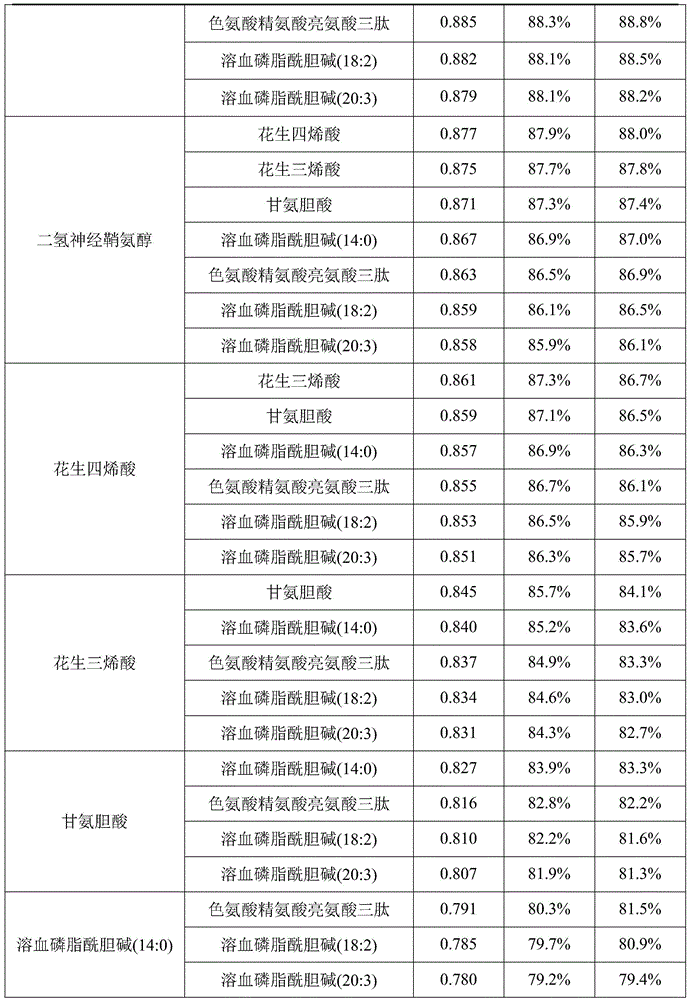Metabolic marker for diagnosing and distinguishing unstable angina pectoris and acute myocardial infarction
A technology for stable angina pectoris and acute myocardial infarction, applied in the field of biochemistry, to achieve the effect of improving the convenience of diagnosis, accurate and reliable results, and high sensitivity
- Summary
- Abstract
- Description
- Claims
- Application Information
AI Technical Summary
Problems solved by technology
Method used
Image
Examples
Embodiment 1
[0028] Example 1: Screening Characterization of Differential Metabolites in Plasma Between Patients with Unstable Angina and Acute Myocardial Infarction
[0029] 1. Objects and methods
[0030] 1. The source of the specimen
[0031] After obtaining the consent of the patients, the peripheral venous blood plasma of 260 patients with unstable angina pectoris, 295 patients with acute myocardial infarction and 350 healthy people in Jiangsu Provincial People's Hospital from September 2010 to June 2015 were collected. Confirmed by coronary angiography. The age and gender of healthy people were matched with patients with unstable angina and patients with acute myocardial infarction. All patients with unstable angina, patients with acute myocardial infarction and healthy people had normal heart, lung, liver, kidney and hematopoietic functions.
[0032] The time of blood collection was in the morning on an empty stomach.
[0033] 2. Main reagents
[0034] Acetonitrile and formic a...
Embodiment 2
[0055] Example 2: Construction of ROC curve to verify the ability of 9 differential metabolites to diagnose and distinguish between unstable angina and acute myocardial infarction
[0056] Receiver operating curve (ROC) method was used for verification, and the ability to diagnose and distinguish patients with acute myocardial infarction and unstable angina was judged by the expression levels of differential metabolites in the plasma of patients with acute myocardial infarction and patients with unstable angina pectoris . The results showed that N-phenylpropionyl-L-glutamine, dihydrosphingosine, arachidonic acid, arachidonic acid, glycocholic acid, lysophosphatidylcholine (14:0), tryptophan Nine differential metabolites of arginine-leucine tripeptide, lysophosphatidylcholine (18:2) and lysophosphatidylcholine (20:3) are individually used in the diagnosis of patients with acute myocardial infarction and unstable The ability of patients with angina pectoris is strong, and the a...
Embodiment 3
[0067] Embodiment 3: the preparation of detection kit
[0068] A detection kit has been prepared based on the metabolic markers provided by the present invention, and the kit includes the following components:
[0069] Standards of metabolic markers: including N-phenylpropionyl-L-glutamine, dihydrosphingosine, arachidonic acid, arachidonic acid, glycocholic acid, lysophosphatidylcholine (14: 0), tryptophan arginine leucine tripeptide, lysophosphatidylcholine (18:2) and lysophosphatidylcholine (20:3), each standard product is packaged separately;
[0070] Plasma metabolite extraction solvent: 100% acetonitrile and 20% acetonitrile aqueous solution (for UPLC-Q / TOF-MS sample preparation); a mixed solution of methanol, chloroform and water in a ratio of 2.5:1:1, methoxyaminopyridine and N-Methyl-N-trimethylsilyl trifluoroacetamide (for GC-Q / MS sample preparation); 20% acetonitrile aqueous solution can be used as dissolved standard in UPLC-Q / TOF-MS screening and characterization ...
PUM
 Login to View More
Login to View More Abstract
Description
Claims
Application Information
 Login to View More
Login to View More - R&D
- Intellectual Property
- Life Sciences
- Materials
- Tech Scout
- Unparalleled Data Quality
- Higher Quality Content
- 60% Fewer Hallucinations
Browse by: Latest US Patents, China's latest patents, Technical Efficacy Thesaurus, Application Domain, Technology Topic, Popular Technical Reports.
© 2025 PatSnap. All rights reserved.Legal|Privacy policy|Modern Slavery Act Transparency Statement|Sitemap|About US| Contact US: help@patsnap.com



